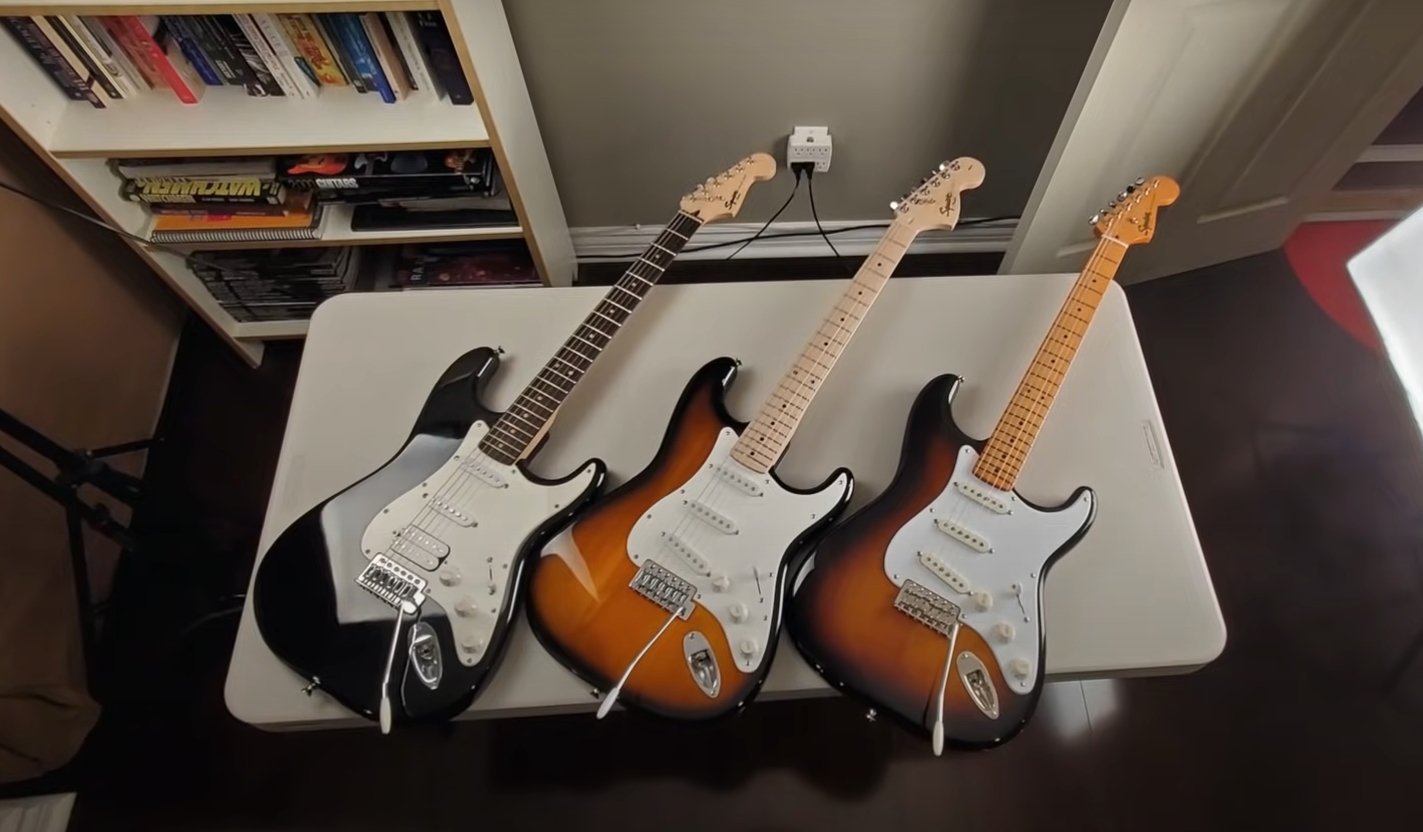The Stratocaster is one of the longest-produced guitars in history and remains to be one of the most versatile and sought-after guitars on the market today.
Having been played by some of the world’s most famous artists—such as George Harrison, Eric Clapton, David Gilmour, Jeff Beck, and Jimi Hendrix (who’s righty-played-lefty style became instantly iconic)—the Strat’s track record precedes itself.
The problem with Strats is singular: the price. While some of us may be able to dish out several months’ paychecks on an instrument (who needs to eat, anyway?), it just isn’t practical for everyone, and with prices ranging from $600 to several thousand dollars, depending on the year and model, a nice Stratocaster can be extraordinarily elusive.
Here’s the good news… Fender’s child company, Squier, makes a cheaper version of the famous axe that’s more accessible for the Average Joe.
The Squier Strat (no, not a squire stratocaster guitar, this isn't the Medieval times) comes in a variety of models: different fingerboard wood, with or without the tremolo bar, different pickup types, and so on. But this review will be on the Squier Bullet Stratocaster with Tremolo bar.
So, let’s get crackin’!
First, let’s talk Squier
Most Affordable
Squier Bullet Strat (Standard) | Fender
The newly redesigned Bullet Strat is ideal for first-timer players looking for an easy-to-play, affordable electric guitar. Its sleek neck provides fast and smooth playability while the improved tuning machines and hardtail bridge ensure rock-solid tuning stability.
Check Priced
Check Amazon Price
We earn a commission if you make a purchase, at no additional cost to you.
The first question I always get when discussing Squier as a cheaper alternative to Fender is: “Well, is it the same as Fender?” The answer to this question is: NO… but, well, kind of.
Back in the ‘60s, Fender bought V.C. Squier, which at the time was primarily a string manufacturer for violins, guitars, and banjos. Founded in the late 1800s by Victor Carrol Squier in Michigan, it’s remarkable that the company remained independent until 1965—the big year when Fender purchased Squier.
The string manufacturing continued, but under the name of Fender, which meant the Squier name became buried in history as a bygone brand… that is, until 1982, when “Squier by Fender” produced its first guitar: the Squier JV, or “Japanese Vintage”.
Ever since, Squier has been the more affordable cousin of Fender guitars, being produced in China, Indonesia, India, Korea, Mexico, and Japan with cheaper materials and lower labor costs. Because Squier is owned by Fender, it is allowed to produce the Fender trademarked guitar styles—the Stratocaster and Telecaster, for example—but the cheaper versions of them.
To sum up: Squier is owned by Fender and is licensed to produce more affordable versions of virtually the same guitars.
Okay, now let’s talk some Squier Bullet specs
- Body: The Squier Bullet body is made of basswood, a cheap and plentiful tonewood that’s most associated with budget guitars despite its ability to deliver wonderful tone results. It’s a light and soft (so don’t bang it around too much) and light-colored wood. Tone-wise, basswood delivers strongest in the mids and has good dynamic response.
- Neck: Squier uses maple for the neck and rosewood for the fingerboard, which is an excellent choice to balance out the mid-heavy delivery of the body’s basswood. A maple-and-rosewood neck provides warmth and overtones galore, giving an immediacy and gemmy presence to the mids and highs and softening out toward the lower end. With 21 frets, the Bullet neck is standard; just don’t expect to have full-blown 24 frets of shreddability.
- Pickups: While Squier Strats can come with a variety of different types of pickups, the Bullet comes with standard Strat single-coils. As opposed to humbuckers’ broad and fat tone, Strat single-coil pickups are iconic for their short attack, bite, and twangy sound. With overdrive, single-coils deliver more present overtones and natural tonewood sustain than the average humbucker.
- Hardware: As far as hardware goes, the Squier Bullet delivers essentially the same options as its Fender counterpart—although with slightly lower quality of parts. The guitar comes equipped with a master volume knob, two tone knobs, and a five-way pickup selector switch. The volume knob controls—would you believe it?—the overall volume of all three pickups. The first tone knob (the middle knob) controls the tone of the neck pickup, and the second tone knob controls the tone of the middle pickup. The bridge pickup doesn’t get any tone control. Unless, of course, you decide to rewire it, which is a fairly common mod.
- Scale: The scale length of most Fender and Squier guitars is 25.5”, which can be found on Strats, Telecasters, and others. Different guitar manufacturers opt for different scale lengths for tonality purposes. For example, the Gibson Les Paul has a scale length of 24.75” (although it has varied through the years). The 25.5” scale length delivers an immediate, rich, and vibrant tone, which is characteristic of Fender guitars—especially when paired with single-coil pickups. For contrast’s sake, the 24.75” scale length of Gibson guitars delivers more warmth and breadth of tone. It sounds softer and the strings have less tension in them when creating the same frequencies as the 25.5” scale length counterpart.
So… how does it sound?
While I absolutely make no claims that the Squier Bullet Strat sounds identical to Fender Stratocasters, it does still sound great.
The most fundamental difference between the guitars—the choice of tonewood—is the primary component to thank for the decrease in both price and tone. Squiers typically use a basswood body, which we discussed earlier. In contrast, Fender Strat bodies are usually made of ash
and alder.
Ash typically delivers more brightness on higher frequencies, while alder provides a deeper low-end. Comparatively, basswood may sound a bit blurred-out across the frequencies, with less acuteness in the tone production.
That said, basswood is nonetheless a reputable wood for electric guitars and has been used not only on budget guitars, but by high-end guitar manufacturers as well.
In the neck department, the Squier Bullet’s maple-rosewood combo is basically the same as the Fender neck, and there’s no noticeable sound difference. Where the difference lies is not in the choice of tonewood, rather in the amount of detailed attention paid to quality control during the manufacturing process.
Fender necks will be pristine and flawless basically every time. Squier necks might have some imperfect frets, off-kilter inlays, or a sub-par finish job. But the wood is the same and should deliver comparable tone.
Also, it should be noted that Squier tuners aren’t quite as reliable as the Fender ones. When jumping on the Squier boat, replacing the tuners with some higher-quality ones will be a quick and cheap upgrade that you’ll thank yourself for later.
In conclusion…
- Pros:
- Super affordable
- Lightweight
- Maple and rosewood neck and fingerboard
- Classic single-coil pickups
- Cons:
- Less attention to detail in manufacturing
- Cheaper hardware
- No Fender name on the headstock
- Less tonal complexity than a Fender
Further Read: Best Electric Guitars for Beginners Guide.
Where to Buy the Squier Bullet Strat
There are a few places I'd check for inventory. In order of priority:
- On GuitarCenter: GC has some of the deepest inventory, with plenty of customization, excellent (and knowledgeable) customer service, and different shipping, delivery, pickup options depending on your needs. Check their Squier Bullet Strat listing here.
- On Amazon: While they might not be guitar experts, they do offer fast shipping and competitive prices. Definitely price check their Squier Bullet Strat listing here.
- On Woodwind & Brasswind: While more traditionally associated with brass and wind instruments, WWWB has a great selection of different color tones of the Bullet Strat here.
- On Music & Arts: They can be a little more expensive, BUT they carry a variety of the harder to find Limited Edition color variations like "Lake Placid Blue", "Sea Foam Green", and "Red Sparkle". Check the Limited Edition collection here.
Final Take on the Squier Bullet Strat
The Squier Bullet Stratocaster is not identical to the Fender Strat. But, it’s pretty damn close. And for the affordable price of $150, what’s not to like?
Bottom Line: I give it a 4.5 out of 5 stars (in the budget guitar department).
The body of the Squier is a little bit softer and lighter than the Fender, and the finish job will be less pristine. The hardware is slightly lower quality, but replacing the tuners and pots at some point is a small price to pay when you’re already saving hundreds of dollars.
Tone-wise, the Squier is a tad bit less rich than the Fender and displays less tonal complexity, but it’s not by a huge margin. Throw on some good distortion or modulation effects and the difference will be even less noticeable.
Over the years since Squier was acquired by Fender, there have been some huge improvements in the quality of budget guitars, and the line between cheaper high-end instruments and high-end budget instruments is getting blurrier every day.
The main difficulty to overcome with the purchase of a Squier is… gulp… your pride. Everybody wants to be seen with Fender written in classic, gorgeous calligraphy across their headstock. It’s an image thing (read a companion review of the Fender Strat).
But just remember: when you’re shredding and the crowd is going wild, nobody is going to pay any attention to the fact that you’re playing a Squier instead of a Fender. Consider swallowing your pride and trying out a Squier Bullet Strat. For the price, it absolutely cannot be beat.
Further Reading:






